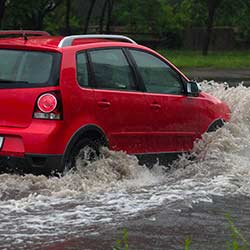
Buyer Beware: The Risks of Flood-Damaged Cars
- May 26
- EVANS / DESHAZO / REILLEY
- Car Accidents
The period between April 2015 and March 2016 was the second wettest on record for Texas. Torrential rains raised the Sabine River in Deweyville to 33.24 feet on March 15, 2016, breaking a record set in 1884. About a month later, 17 inches of rain fell in Houston in 24 hours, and floodwaters caused at least eight deaths and an estimated $5 billion in damage to buildings and vehicles.
Last June, Texas Monthly magazine reported that May floodwaters were believed to have damaged up to 10,000 cars in the state, primarily in Dallas, Austin, San Antonio, and Houston. And while Texas law requires sellers of used cars to declare via the vehicle’s title whether a vehicle has been rebuilt or previously deemed too damaged to be roadworthy, some unscrupulous sellers can easily get around that requirement.
The problems that can occur in a flood-damaged vehicle can be costly and dangerous. If water has infiltrated electronics, components such as airbag controls and anti-lock brakes could fail. If you’re in the market for a used car, keep an eye out for signs of water damage. And if your own car has been damaged by floodwaters, it’s important to know what rights you have under your car insurance policy.
How Flood Damage Claims Work
When you have a comprehensive auto insurance policy, you can file a claim for flood damage. Insurers may decide that the car is damaged beyond repair – or “totaled” – and issue a payment for the cost of the vehicle, or, if the damages are minor, issue a payment for repairs. Texas law affords consumers with comprehensive insurance another right: to file a claim for “diminished value.”
Diminished Value Claims
Diminished value means the damage to your vehicle makes it less appealing to buyers, when compared to other identical vehicles; given a choice between a car that has previous flood damage and one that doesn’t, a buyer will choose the undamaged car. Texans who file a claim for diminished value should be entitled to compensation for their loss, but insurers may try to avoid paying such a claim. In such cases, consulting with a car accident attorney can be a crucial step to ensure you receive the compensation you deserve.
People who have a liability-only insurance policy cannot file a claim for flood damage. But if their car is a total loss, they could easily try to sell their car and hide evidence of flood damage.
A person who takes a flood-damaged car across state lines can re-register it in that state, apply for a new vehicle identification number, and sell it there or in their home state without disclosing the flood damage. That’s called title-washing, and it has resulted in many consumers unknowingly purchasing water-damaged cars.
Signs of Flood Damage
A title search will reveal information about a car’s history, such as flood damage, crashes and major repairs – but only if the title hasn’t been scrubbed of that information. Buying from a dealership or reputable used car dealer is the best way to avoid flood-damaged cars, but if buying from an individual, look for these signs of flood damage:
- Mineral deposits on doors or upholstery
- Brand new upholstery in an old car
- Warped door panels
- Musty odor or the presence of mold or mildew
- Overwhelming scent of air freshener or cleaning products
- Silt or debris in the trunk.
If you’re considering buying a used car, have it inspected by a mechanic of your choosing.
If you have questions about how flood-damaged vehicles might apply to your situation, discuss it with one of the attorneys at the Austin, TX-based Evans Law Firm. We have years of experience protecting the rights of Texans, offering small law firm attention with big law firm results. Call today at 1-855-414-1012 or fill out this online contact form to find out how we can help you.

 Serving Clients Throughout Texas
Serving Clients Throughout Texas
 Chip Evans is a partner at Evans & Herlihy. Chip brings to the firm more than 20 years of experience as a trial lawyer representing Plaintiffs. It is the desire to help individuals, not corporations, that attracts Chip to this side of the docket. [
Chip Evans is a partner at Evans & Herlihy. Chip brings to the firm more than 20 years of experience as a trial lawyer representing Plaintiffs. It is the desire to help individuals, not corporations, that attracts Chip to this side of the docket. [